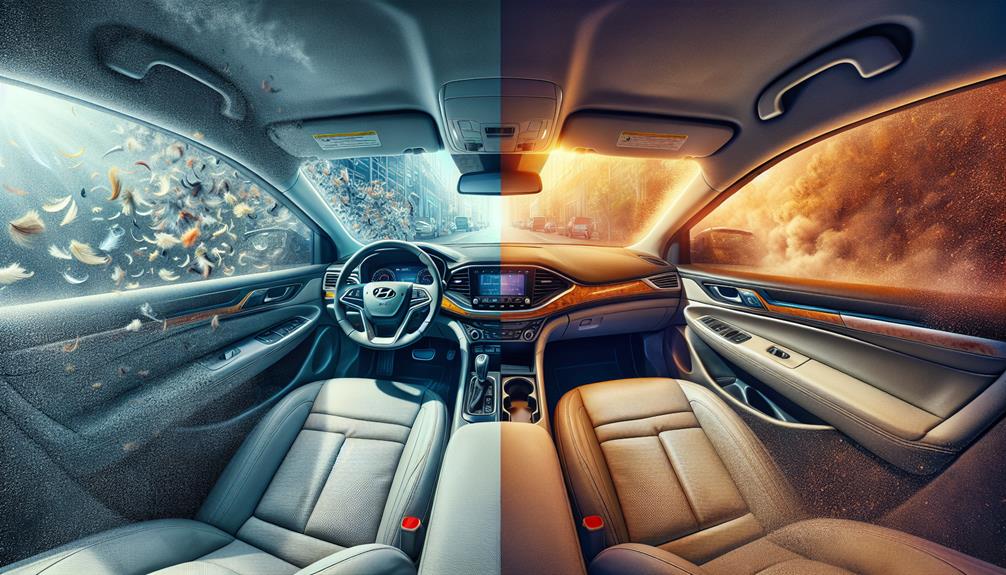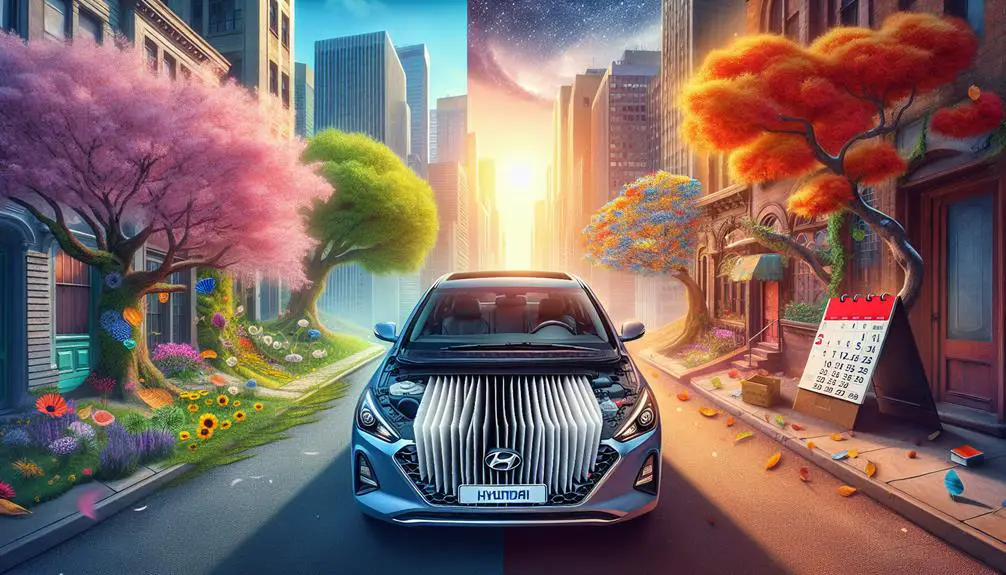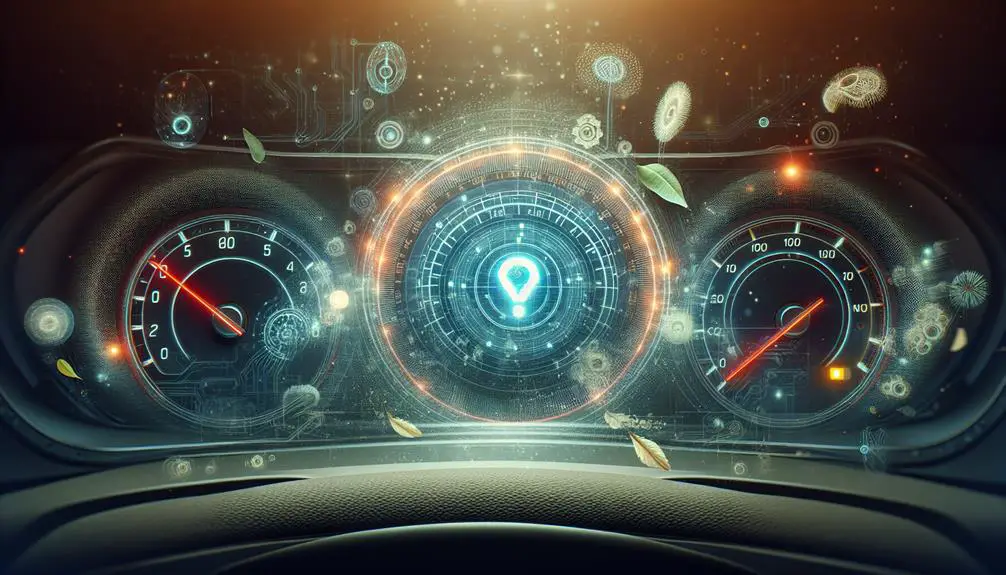Hyundai recommends changing the cabin air filter every 15,000 to 30,000 miles, depending on your driving conditions. Factors such as driving in polluted or dusty areas can shorten this interval.
Signs that it might be time for a replacement include reduced air flow through your HVAC system, bad odors, and increased noise from the fan.
Keeping an eye on these indicators will help ensure the air in your Hyundai remains clean and your driving experience is comfortable.
Importance of Cabin Air Filters

Cabin air filters play an essential role in maintaining the air quality inside your Hyundai, filtering out pollutants, allergens, and dust from the air you breathe. These filters are your vehicle's primary line of defense against the variety of particles present in the air, ensuring that you're not subjected to harmful contaminants. When it pertains to allergy prevention, a clean cabin air filter is indispensable. It captures pollen, mold spores, and other allergens, greatly reducing your exposure to these irritants. This is particularly critical for individuals with respiratory conditions or sensitivities, as it can lead to a more comfortable and safer driving experience.
Furthermore, air quality improvement within the cabin isn't just about removing allergens. A well-maintained filter also eliminates odors and smoke, providing you with a fresher and more pleasant environment. It's designed to trap fine particles that might otherwise find their way into the vehicle's ventilation system, thereby preserving the system's efficiency and prolonging its life.
Essentially, by ensuring your Hyundai's cabin air filter is in ideal condition, you're not just protecting your health and enhancing your driving comfort; you're also safeguarding the integrity of your vehicle's HVAC system.
Hyundai's Recommended Replacement Intervals
Apprehending the significance of a clean cabin air filter for your Hyundai's air quality and HVAC system's longevity, it's imperative to know the manufacturer's recommended intervals for replacement. Hyundai advises that you change your vehicle's cabin air filter every 15,000 to 30,000 miles. However, this range can vary greatly depending on specific model variations and driving conditions. Adhering to these guidelines isn't only crucial for maintaining top-notch air quality inside your vehicle but also for guaranteeing the durability of the HVAC system itself.
- Model Variations: Different Hyundai models might've specific replacement intervals, reflecting their unique engineering and design.
- Driving Conditions: Frequent driving in dusty or polluted areas may necessitate more frequent changes.
- Warranty Implications: Failing to replace the filter as recommended could impact warranty coverage on the HVAC system.
- Visual Inspection: Regular checks can help identify when a replacement is necessary ahead of schedule.
- Professional Consultation: A certified Hyundai technician can offer model-specific advice and guarantee proper filter replacement.
Comprehending these aspects ensures you keep your Hyundai's cabin air quality high and may prevent potential issues related to warranty implications because of neglect or oversight.
Factors Affecting Filter Lifespan

Comprehending the factors that affect your Hyundai's cabin air filter lifespan is vital for high-quality maintenance and performance. The type of filter materials and the driving conditions you encounter are pivotal in determining how often you'll need to replace this component.
Filter materials vary, with some designed for basic filtration, while others offer advanced protection from micro-particles. High-quality filters, often made from synthetic fibers, can trap smaller particles and therefore, might last longer. However, these premium filters require careful monitoring as their efficiency can degrade because of the accumulation of dirt and pollutants.
Driving conditions play a significant role too. If you're frequently driving in dusty areas or heavy traffic where air pollution is higher, your cabin air filter will work harder and, as a result, need replacing more often. Urban driving, with its stop-and-go traffic, tends to introduce more pollutants into your car's interior, accelerating the filter's wear and tear. On the other hand, if your driving is mostly in cleaner, rural areas, the filter can last longer because of less exposure to contaminants.
Understanding these factors ensures you're not caught off guard by a sudden decrease in air quality inside your Hyundai, maintaining a clean and healthy environment during your drives.
Step-by-Step Replacement Guide
After grasping the factors that impact the lifespan of your Hyundai's cabin air filter, you're now ready to learn how to replace it properly. Ensuring you have the right filter compatibility is critical for a seamless installation process. Here's a concise step-by-step guide, focusing on technical precision and detailing the necessary installation tools.
- Identify Filter Compatibility: Before starting, verify the cabin air filter is compatible with your Hyundai model. This guarantees a snug fit and the best filtration.
- Gather Installation Tools: Typically, you'll need a screwdriver and possibly a pair of gloves. Some models might require specialized tools, so consult your owner's manual.
- Locate the Filter Housing: Generally found behind the glove box or under the dashboard, the exact location can vary. Reference your vehicle's manual for specifics.
- Remove the Old Filter: Carefully open the filter housing and slide the old filter out. Note the direction of airflow indicated on the filter.
- Install the New Filter: Insert the new filter in the correct orientation, ensuring it fits securely. Close the housing and reassemble any removed parts.
This guide, emphasizing filter compatibility and the use of proper installation tools, will help you achieve a successful replacement, enhancing your Hyundai's air quality.
Signs Your Filter Needs Changing

Several indicators can alert you that your Hyundai's cabin air filter requires changing, including reduced airflow from the vents, persistent unpleasant odors, and an increase in interior dust accumulation. When the cabin air filter clogs with debris, airflow to your vehicle's interior diminishes, making your HVAC system work harder. This not only affects your comfort but can impact fuel efficiency because of the increased load on the engine.
Persistent odors are another sign that your cabin air filter needs attention. A clean filter effectively traps odors, pollutants, and particulates, ensuring the air inside your Hyundai remains fresh. If you notice a musty or unpleasant smell emanating from the vents, it's likely time to replace the filter.
Furthermore, an increase in dust and particulate matter inside your vehicle indicates a compromised cabin air filter. This not only affects the cleanliness of your interior but can be a concern for passengers requiring allergy relief. A clean, efficient filter captures allergens and dust, greatly improving the air quality inside your Hyundai.
Recognizing these signs and promptly replacing your cabin air filter can improve your driving experience, improve fuel efficiency, and provide vital allergy relief by maintaining superior air quality inside your vehicle.
Conclusion
Ensure you should prioritize changing your Hyundai's cabin air filter regularly. Follow Hyundai's recommendation, typically every 15,000 to 30,000 miles, but consider factors like driving conditions and air quality.
A step-by-step guide guarantees a precise replacement process. Watch for signs like reduced air flow or musty odors signaling the need for a change.
Regular maintenance of your cabin air filter guarantees a healthier, more comfortable driving environment, optimizing your vehicle's HVAC system performance.